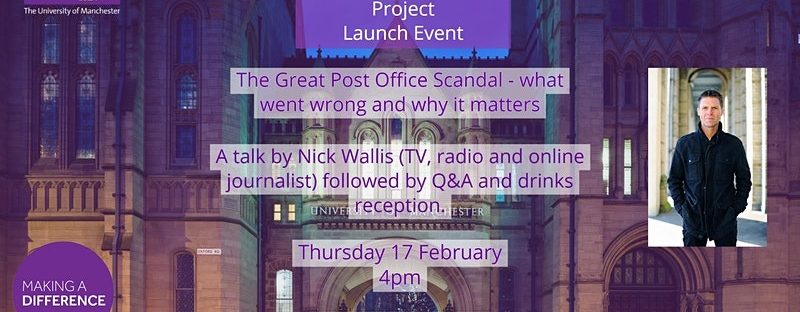Nick Wallis: the man who helped amplify the story of the UK’s largest ever miscarriage of justice
- Northern Quota speaks to Nick Wallis, the BBC journalist who helped amplify the Post Office Horizon scandal
Nick Wallis, the man who brought the Post Office scandal, the largest miscarriage of justice in British legal history, into the national discourse speaks to The Northern Quota.
He’s wearing a sharp suit with a haircut that is effortlessly dishevelled in the most stylish way.
He approaches with a youthful energy and a playfulness that belies the serious work he has done in helping to amplify the story.
Once we start talking about his work, it’s clear he has an in-depth working knowledge of the legal case and the personal destruction visited upon sub-postmasters.

At what point did you know this was a story?
Nick had been working in local radio when he was approached by a taxi firm offering to take on the contract for the broadcast outlet.
Because local radio didn’t have the money to pay for a contract, he jokingly responded that he would give them a contract if the taxi firm would “give them some stories”.
That’s when he received a message from a taxi driver named Davinda Misra, who said he had a story about a friend who had lost everything to a faulty accounting system at the Post Office.
Nick was directed to an article by Computer Weekly, who first broke the story, and a campaigning organisation which had already looked into the case.
“If the information is already out there and there is an organisation already campaigning, and Davinda didn’t sound like he was trying to pull the wool over anybody’s eyes, at the very least I should go see him,” said Nick.
Nick went to see him and started “pushing him for details”.
After deciding there was something worth investigating, Nick took it to his colleagues.
“I checked all the details and made sure everything was absolutely correct and then sent of an email,” he says.
“I got a reply, if not that day the day after, saying ‘that sounds really interesting. I’ll put two of my best producers on it and, if it stands up we’ll run with it.'”

Why did the news story come in and out of the news cycle?
“There are brilliant journalists doing brilliant things. The BBC, Private Eye, the Daily Telegraph sporadically, and the Daily Mail more-so recently, but also sporadically, have looked into the scandal.
“The story is there, they get periodically interested because there’s nothing to sustain it.”
However, Nick says that between 2015 and 2018 there were very few media outlets reporting what was happening. may be because it was both a difficult story to cover and because “the Post Office went out of its way to try to pressure, refute and deny everything the postmasters were saying”.
When did you realise something was going seriously wrong rather than simply a few mistakes being made?
“The first time I knew there was something seriously wrong was when an internal post office investigation of a postmaster charged with theft found that there was ‘no evidence of theft’. So, an internal investigation at the post office wrote an official report ‘no evidence of theft’ yet, at the same time, the postmaster was charged with theft.”
“So, it’s a really important question: ‘who knew what when?’
“Over the next year we will hear form executives at Fujitsu, the post office, the civil service and the government who will have to give evidence under oath. Then, hopefully, we will start to find out exactly what they knew, to get an understanding of what was going on behind the scenes, not just while they were prosecuting sub-postmasters but, when they realised they had unsafe prosecutions, they covered them up.”
How did Fujitsu (the company who built the faulty Horizon accounting system) manage to deflect blame for the software?
“By keeping their heads down and saying nothing. They made the point that they ran the computer systems but that was all.”
Did you get a moral buzz from helping the postmasters get justice, or is it purely professional?
“I’m just doing my job. My job is to report stuff that I see as being interesting.
“I never risked anything. There are people who have risked everything, their careers, their reputations to get this story out there. All I’ve done is picked it up and ran with it.
“I was so lucky this incredible story fell in my lap and I was in a position where I was able to persuade a brilliant editor.”
How far do you think you can go, when objectively something bad has happened, to say this is ‘bad’ as opposed to ‘this just happened’?
“Until the 2019, when the first judgement came down, I would just say this is what they’re saying and this is what everyone else is saying.
“Obviously, I was reporting it where I have a legal responsibility to be contemporaneous, accurate and fair, so I wasn’t making any value judgments.
“When a high court judge, on 15 March 2019, basically endorsed the sub-postmasters’ position in extraordinary detail, colour and damning language, then you can make a value judgement.
“I’m not saying this because I think it is true, I’m saying it because this is true, because a high-court judge has said it’s true after examining all the facts.”

Nick Wallis has his own professional website and a blog about The Post Office Scandal.


